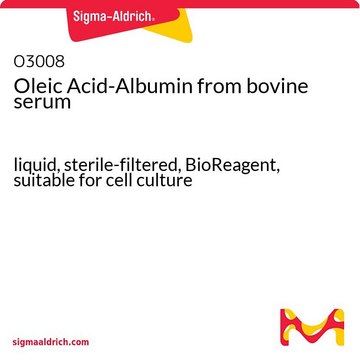O1008
Oleic acid
≥99% (GC)
Synonym(s):
9Z-Octadecenoic acid, cis-Oleic acid, cis-9-Octadecenoic acid, Elainic acid
About This Item
Recommended Products
biological source
plant (Sunflower)
Quality Level
vapor pressure
1 mmHg ( 176 °C)
Assay
≥99% (GC)
form
viscous liquid
color
colorless to very faintly yellow
refractive index
n20/D 1.459 (lit.)
bp
194-195 °C/1.2 mmHg (lit.)
mp
13-14 °C (lit.)
solubility
H2O: insoluble (practically)
alcohol: soluble
benzene: soluble
chloroform: soluble
oil: soluble (fixed and volatile)
density
0.89 g/mL at 25 °C (lit.)
application(s)
life science and biopharma
lipidomics
functional group
oleic acid
lipid type
unsaturated FAs
shipped in
ambient
storage temp.
−20°C
SMILES string
CCCCCCCC\C=C/CCCCCCCC(O)=O
InChI
1S/C18H34O2/c1-2-3-4-5-6-7-8-9-10-11-12-13-14-15-16-17-18(19)20/h9-10H,2-8,11-17H2,1H3,(H,19,20)/b10-9-
InChI key
ZQPPMHVWECSIRJ-KTKRTIGZSA-N
Gene Information
human ... PRKCA(5578) , PRKCB(5579) , PRKCD(5580) , PRKCE(5581) , PRKCG(5582) , PRKCH(5583) , PRKCI(5584) , SOAT1(6646) , SOAT2(8435)
Looking for similar products? Visit Product Comparison Guide
Related Categories
General description
Application
- to study the effects of fatty acids on gastric cancer (GC)
- to induce lipid droplet formation in cell culture
- as an additive in the magnetorheological fluid preparation.
Biochem/physiol Actions
Other Notes
comparable product
related product
Storage Class Code
10 - Combustible liquids
WGK
WGK 1
Personal Protective Equipment
Choose from one of the most recent versions:
Already Own This Product?
Find documentation for the products that you have recently purchased in the Document Library.
Customers Also Viewed
Articles
Fatty acids of the n-3, n-6 and n-9 families are important supplements for cell culture systems. They are important in cell culture systems used to biomanufacture heterologous proteins, such as monoclonal antibodies.
How the unsaturated fatty acid, oleic acid and other cell culture components affect the performance of serum-free, protein-free cell culture systems used for biomanufacturing heterologous proteins including monoclonal antibodies.
Related Content
DISCOVER Bioactive Small Molecules for Neuroscience
Our team of scientists has experience in all areas of research including Life Science, Material Science, Chemical Synthesis, Chromatography, Analytical and many others.
Contact Technical Service








